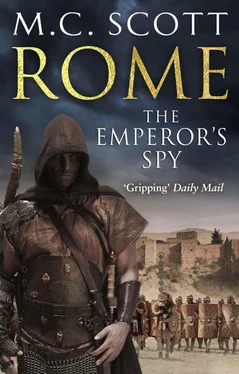M. Scott - Rome - The Emperor's spy
Здесь есть возможность читать онлайн «M. Scott - Rome - The Emperor's spy» весь текст электронной книги совершенно бесплатно (целиком полную версию без сокращений). В некоторых случаях можно слушать аудио, скачать через торрент в формате fb2 и присутствует краткое содержание. Жанр: Исторические приключения, на английском языке. Описание произведения, (предисловие) а так же отзывы посетителей доступны на портале библиотеки ЛибКат.
- Название:Rome: The Emperor's spy
- Автор:
- Жанр:
- Год:неизвестен
- ISBN:нет данных
- Рейтинг книги:3 / 5. Голосов: 1
-
Избранное:Добавить в избранное
- Отзывы:
-
Ваша оценка:
- 60
- 1
- 2
- 3
- 4
- 5
Rome: The Emperor's spy: краткое содержание, описание и аннотация
Предлагаем к чтению аннотацию, описание, краткое содержание или предисловие (зависит от того, что написал сам автор книги «Rome: The Emperor's spy»). Если вы не нашли необходимую информацию о книге — напишите в комментариях, мы постараемся отыскать её.
Rome: The Emperor's spy — читать онлайн бесплатно полную книгу (весь текст) целиком
Ниже представлен текст книги, разбитый по страницам. Система сохранения места последней прочитанной страницы, позволяет с удобством читать онлайн бесплатно книгу «Rome: The Emperor's spy», без необходимости каждый раз заново искать на чём Вы остановились. Поставьте закладку, и сможете в любой момент перейти на страницу, на которой закончили чтение.
Интервал:
Закладка:
In the gusting morning, with the sharp colours of the banners crisp against the late morning sky, with the chatter of children and the crying seagulls at the harbour, Pantera felt the world grow still and quiet.
Nero said, ‘Pantera?’
‘My lord, forgive me, this is… a deeper thing than I had imagined.’
‘So you understand it?’
‘Some of it, I think. Not all.’
Animated, Nero said, ‘It is the Hebrews, isn’t it? They believe in the Kingdom of Heaven, a time when their god will rule over all others, when their laws will be the only laws, when all men must be circumcized and refuse the meat of idols. Our uncle Claudius had them banned from our seat of rule seventeen years ago. We could do the same thing again.’
‘It is Hebrew in concept,’ Pantera agreed. ‘But only a fanatical few desire it and even they know that you would raze Jerusalem to the ground if they so much as contemplated burning Rome. If there’s a fire, it will not be lit by any man who cares for Judaea.’
He folded the note squarely, and handed it back to the emperor. ‘This is a copy,’ he said. ‘The gaps are deliberately made to leave the full meaning unknowable, particularly the date of the burning. May I see the full script?’
Nero shrugged. ‘We don’t have the original. Akakios… retrieved this from a Syrian messenger who was endeavouring to sell it. For a further sum of gold — a quite extortionate sum — the highest bidder was to be given the prophecy in full, which would give the date when the fire must occur and also a greater insight into what might be rent thereafter.’
‘The Syrian, then, can tell you where to find what you seek.’
‘Regrettably not.’
‘He died under questioning?’
Nero pulled a face. ‘As you have noted, Akakios is reckless. But the Syrian knew nothing of the prophecy or where it was kept. He hadn’t seen it or read it and knew nothing beyond that a white-haired, hoarse-voiced man had given him the copies and charged him with getting the best price for each. That much, I believe.’
‘Where did this take place? Where was he given the copies?’
‘In an inn named for the Black Chrysanthemum which is on the Street of the Lame Lion in Alexandria.’ Nero spoke the place names as if they were sacred text. ‘He believed the vendor to have been a local astrologer, but could not be sure. The man spoke Greek with a local Alexandrian accent, and had ink stains on his fingers.’
Pantera laughed, and only late remembered that to do so in front of one’s emperor was not wise. ‘Astrologers in Alexandria are like fishermen in Coriallum: every second man makes it his profession and those in between believe they know more but simply don’t choose to make money thereby.’
‘And to say he was old, white-haired and greedy is merely stating a fact of all astrologers. We know this.’
The emperor leaned back against the stables, chewing his lip. Pantera moved to get the best view of both ends of the row. Around them, the barn was coming to life as, at last, the Green team began to make ready. The lanky youth at the chariot moved round and began to work on the harness on the offside. He gave every appearance of not yet having noticed the presence of his emperor.
Beyond him, a smaller, thinner boy with grubby blond hair and a tear in the hem of his tunic brought two fresh colts out of the barn, one rope held in either hand. His charges danced and spun irritably beside him. They were not of the calibre of the magistrate’s team, but Pantera would happily have bet the contents of his purse on their coming second.
Nero, too, was watching them. Absently, he said, ‘I was there when the Syrian spoke to us, so that I could hear the truth of it. At the end, he said something that was true, out of his love for me, not because it was wrenched from him by pain.’ He frowned, remembering. ‘He said that the prophecy is harmless to me and to Rome unless someone wishes so badly to bring about the Kingdom of God that they count it as nothing to murder thousands of men, women and children. What kind of man does that?’
‘The kind who hates Rome and Jerusalem equally,’ Pantera said, carefully. He, too, was watching the horses. ‘Men like that are few, and there are ways to find those with whom they conspire, although I doubt if they’re in Gaul, or even… my lord, forgive me, this is a subject of great weight, but I think we must speak of it later if we are not to see bloodshed. Those two chestnut colts are going to fight.’
Math saw Pantera at the moment before Brass bit his arm hard enough to draw blood, and then lunged for Bronze.
In a morning filled with bad omens, it was the worst. First, Ajax had been called away by the magistrate’s steward to a meeting of the four race-drivers and had not yet returned. Then Lucius, the motherless son of a mange-ridden street dog who was the elder of Ajax’s two apprentices, had taken to fiddling with the traces and refused to help harness the two lead colts.
Lucius was sixteen years old, lanky and callow with bad skin and crooked teeth, and he was scared of horses. Gordianus had been his uncle, which was the only reason he had been given the apprenticeship, and Ajax, who could be breathtakingly soft at times, had promised to let him finish.
He and Math hated each other, and Lucius had taken to spending the nights in town with one of the newly arrived harness-makers, coming back with stories of work that far exceeded anything Math’s father could do. Ajax had neither listened to him nor beaten him into silence. Math was waiting for the day either might happen.
True to form, Lucius had spent the night before race-day in town and come back looking ragged and tired. He had been more than usually afraid of the colts all morning, and had not denied it when Math shouted the accusation, just put his head down by the back wheel and made a show of fixing the harness. Left alone, knowing that the other three teams were already out on the training track, Math had done what seemed best and brought the two colts out together.
His mother had always taught him, and from the first days of his apprenticeship Ajax had agreed, that if he were ever to harness the quadriga on his own, Math should always lead out the colts as a pair. Brought out singly, whichever of the two was put first in the traces was likely to fight the new one coming in and, as Ajax said at least once every morning and often in the afternoons and evenings as well, the colts were built of meat and bone and fury, while the chariots were of fragile wood and wicker. ‘Better to lose a bit of skin off a colt than the entire racing chariot.’
Ajax had never, Math thought, owned his own race-chariot before, while everyone in the world had owned a colt or two by the time they were twenty.
So he did as he was told and brought out Brass and Bronze together, the two chestnut colts, seven years old, in the primes of their lives, race-fit and lethal and, as Ajax had said, filled with fury.
They hated each other; it was what made them so exceptionally good, and so exceptionally difficult to handle. For the right driver, who could take all that rage and turn it into speed, they would run their hearts out to best each other, and so win the race. With the wrong driver, a man who lost his concentration, or did not have the beasts’ respect, they could run themselves to a halt and fight in the traces, wreaking havoc on the track. Math had seen that happen once, and never wished to again.
Getting them into the traces in the first place was his responsibility and, on the morning of the emperor’s race, it had seemed for a while as if he might succeed.
He had prayed to Nemain of the moon and to Manannan of the seas, who had become something of a favourite with the boys who plied the docks, and to his mother, who was his patron god and had bred the colts. With all that divine help, he had backed Brass and Bronze nearly up to the bar, with the two rearmost geldings standing peacefully enough.
Читать дальшеИнтервал:
Закладка:
Похожие книги на «Rome: The Emperor's spy»
Представляем Вашему вниманию похожие книги на «Rome: The Emperor's spy» списком для выбора. Мы отобрали схожую по названию и смыслу литературу в надежде предоставить читателям больше вариантов отыскать новые, интересные, ещё непрочитанные произведения.
Обсуждение, отзывы о книге «Rome: The Emperor's spy» и просто собственные мнения читателей. Оставьте ваши комментарии, напишите, что Вы думаете о произведении, его смысле или главных героях. Укажите что конкретно понравилось, а что нет, и почему Вы так считаете.












